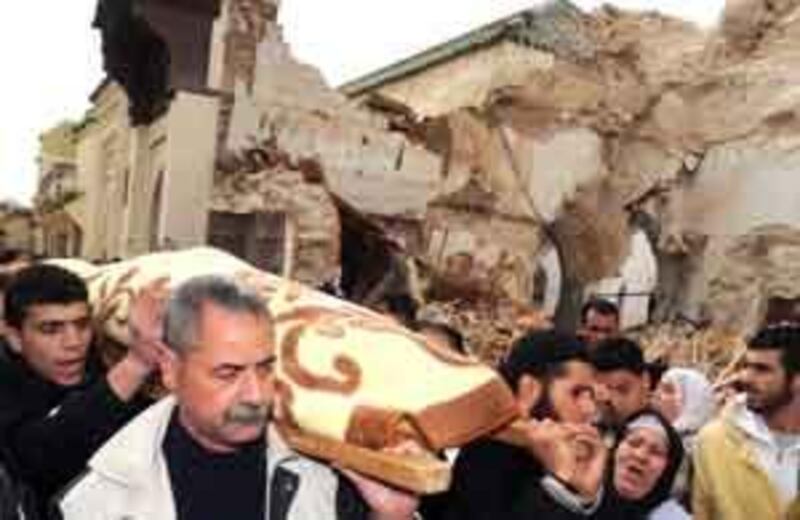MEKNES, MOROCCO // Ahmed Ben Amer was kneeling for the midday prayer at the Bab el Bardiyine mosque in Meknes on Friday when far above him, the mosque's minaret imploded, raining bricks and dust that killed 41 gathered worshippers, including Ben Amer, and injured 75.
The government has blamed the disaster on heavy rains that had recently lashed Meknes, a medieval city on Morocco's northern plains. Locals say the city spent years ignoring warnings that the mosque was in danger of collapse. King Mohamed VI has ordered the minaret, once among Meknes's tallest, rebuilt in its original form, and the justice ministry has launched an inquest to determine what brought it crashing down.
Residents of the Bab el Bardiyine quarter are speculating about rotten beams and the possible effects of a fire several years ago at an adjacent woodlot as they digest Friday's horror in quiet shock. Ben Amer's wife, Kamila Driouiche, was at home when she heard the call to prayer and, suddenly, "a sound like a bomb going off". She dashed down the alley to the mosque. Where the minaret had stood she saw figures struggling inside clouds of dust, and despair overcame her. "That's it, then," she thought. "It's over."
Young men poured in to rescue the trapped and retrieve the dead. Ben Amer's son, Saber, and his son-in-law, Abdejalil Bouzidi, pawed through the rubble at his usual spot near the back door. "There was a terrible stillness," recalled Mr Bouzidi, 32, who sells clothes in Meknes's market. "Except when people found a body and said 'Allahu Akbar'." Later, police, firemen and rescue workers arrived. Among them was Hicham Dahhou, 30, an electrical appliance repairman and five-year volunteer with the Red Cross.
He was at home when a friend telephoned him. Had he seen Al Jazeera? A minaret had collapsed. Within minutes, Mr Dahhou was tearing through Meknes in his car. "When I got there the place was like an anthill. Police, Red Cross, locals, everyone digging." Mr Dahhou attacked the debris with hydraulic shears, helping extract more than a dozen corpses. "Some had internal haemorrhaging and broken bones; others just had blood in their eyes," he said. A few had feet broken as they prostrated themselves in prayer.
Mr Bouzidi and Mr Ben Amer uncovered Ahmed Ben Amer. He was wearing his fine Friday jellaba and his face was blackened in death. On Saturday morning, Ben Amer's family buried him outside the Bab el Bardiyine gate, beneath a grey sky splotched with clouds. Then they went home to mourn. "For years, we've been saying that the mosque was in danger," said Mr Bouzidi, huddled in the sitting room with three generations of Ben Amers. "But the authorities just gave it a new coat of paint, like make-up on a woman."
King Mohamed wants engineers to assess old mosques throughout Morocco, as Friday's disaster raises concerns of more accidents in ancient - and sometimes dilapidated - cities such as Meknes. The Bab el Bardiyine mosque dates to the reign three centuries ago of the powerful sultan Moulay Ismail, who made Meknes his capital as he ruthlessly subdued enemies and hammered together the foundations of the modern Moroccan state. The city declined after Moulay Ismail's death in 1727. Writing over a century later, The Times of London's Morocco correspondent, Walter Harris, called Meknes "a city of the dead ? strewn with marble columns and great masses of ruin".
French rule in the 20th century began breathing life back into the city, which served as France's military headquarters and is today the heart of Morocco's wine industry. Ahmed Ben Amer, a former fisherman, came to Meknes two decades ago. With his wife and five daughters, he lived behind a red door in the old medina and sold fish in the market. The door was thrown open Saturday as neighbours passed through the house to console Ms Driouiche, slumped in the white gown of mourning beside a television playing prayers.
Slowly, painfully, the family is taking stock of the future. "After my daughter was born, my father told me, 'Now you've become a man'," said Saber Ben Amer, 23 and an electrical engineer. "There are 11 people under this roof that depended on him; now they'll be depending even more on me." At the Bab el Bardiyine gate, ambulances ferried the dead home from the hospital for their funerals. Mr Dahhou stacked wooden stretchers by the square in preparation, and some men prayed on rugs under a white pavilion.
And with the regularity of the prayers came the bustling and wailing in the street as the shrouded corpses emerged, riding a sea of shoulders towards the grave. jthorne@thenational.ae





